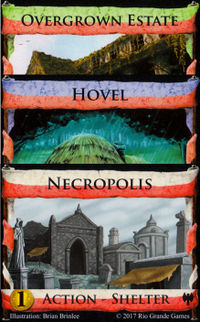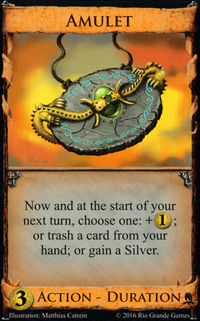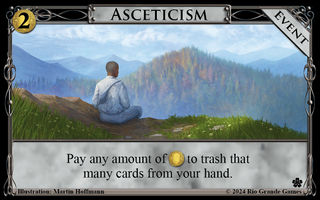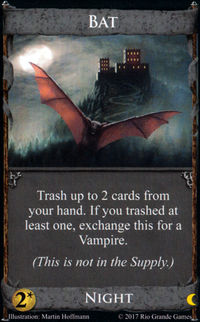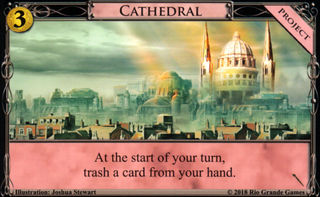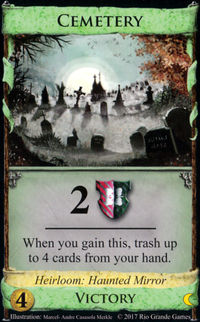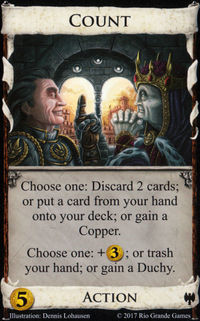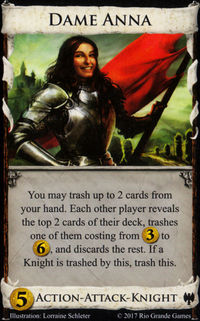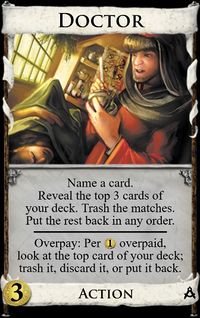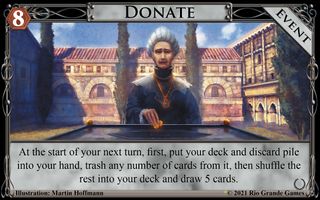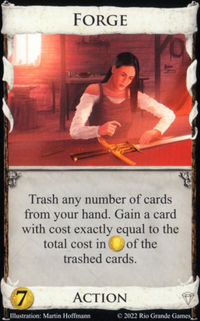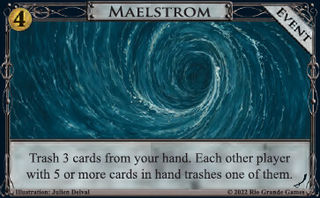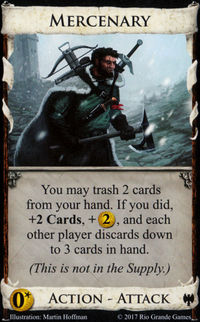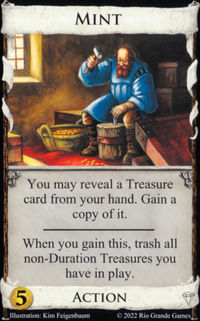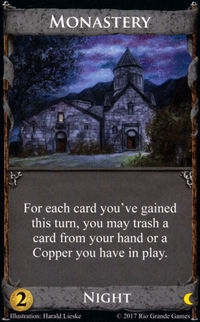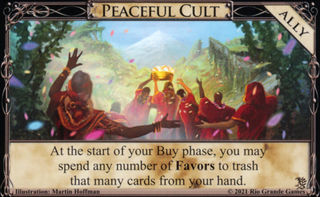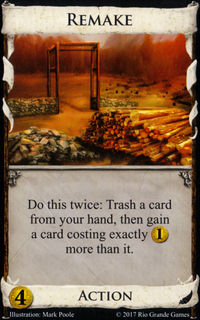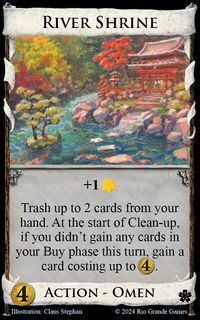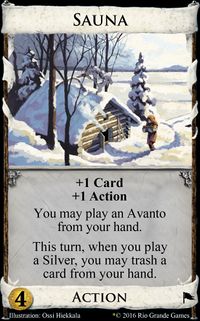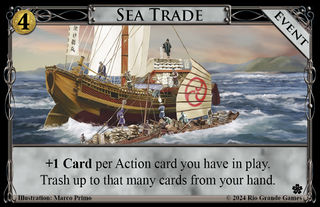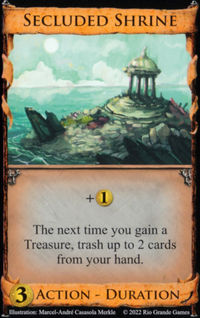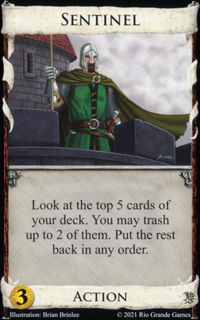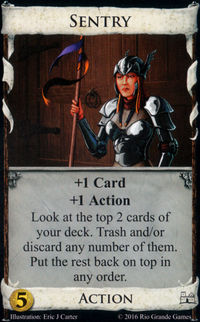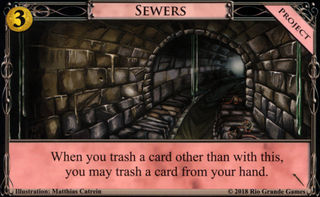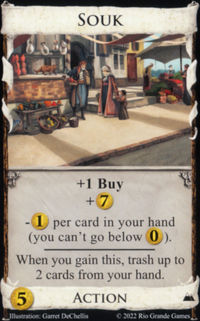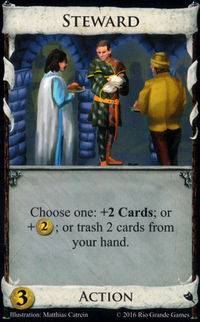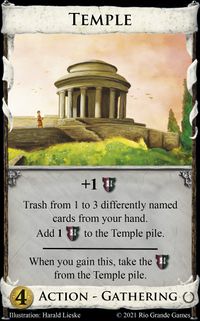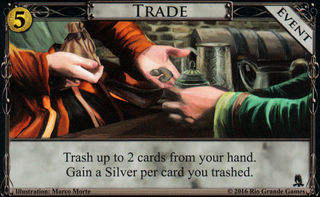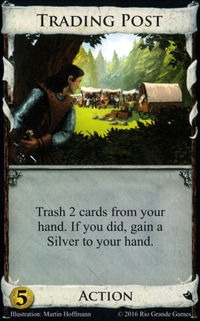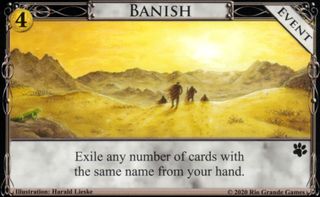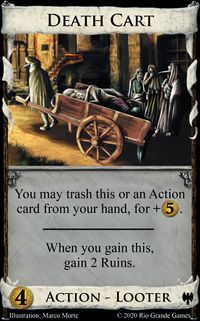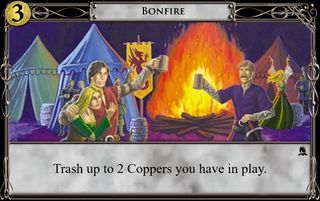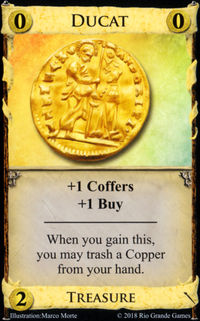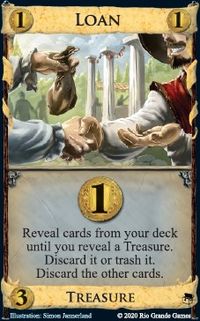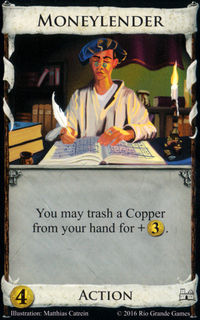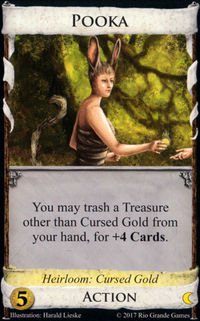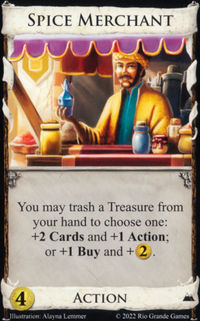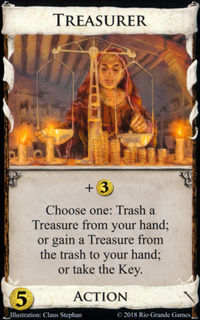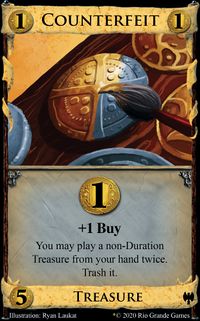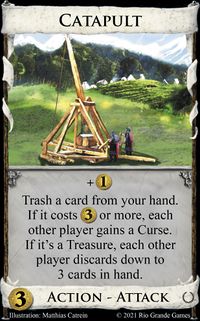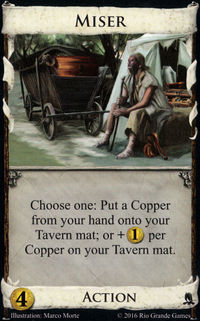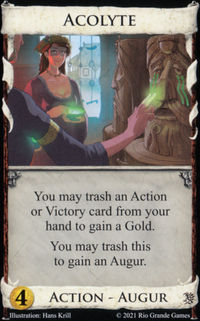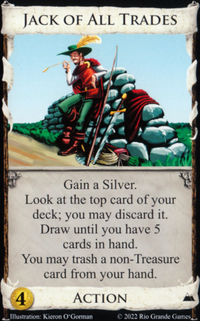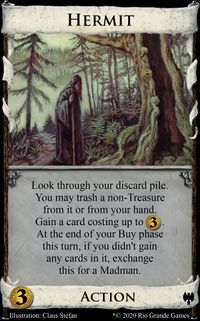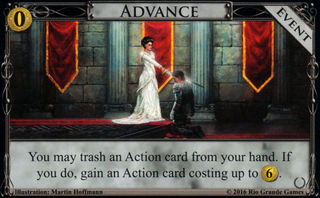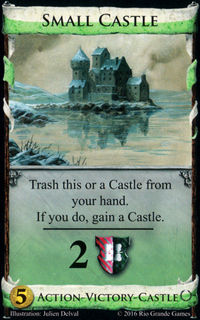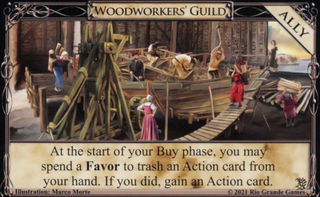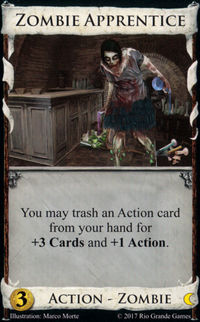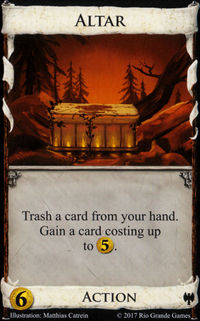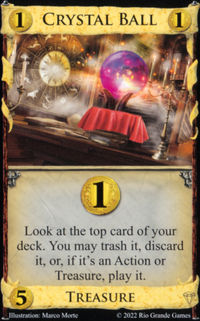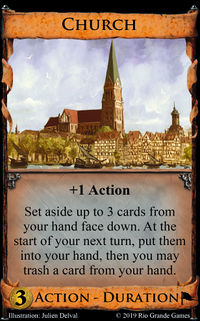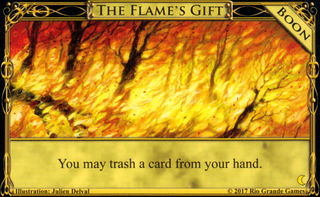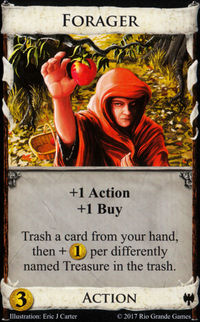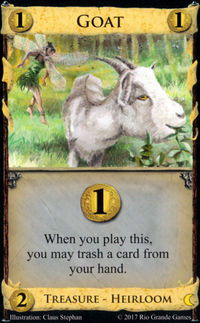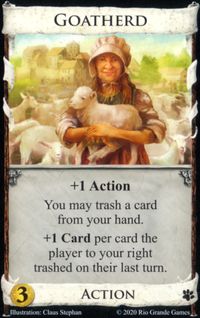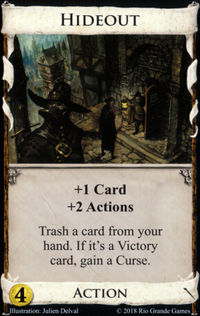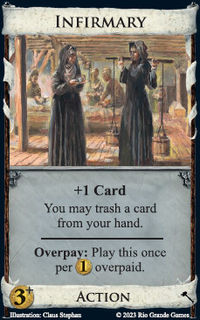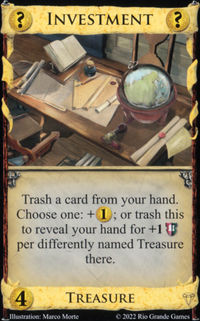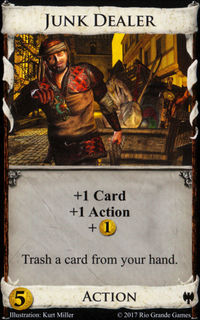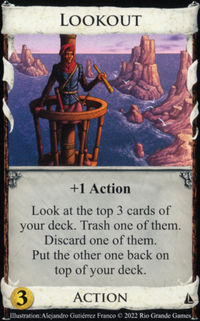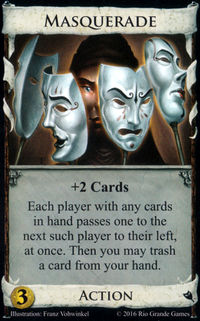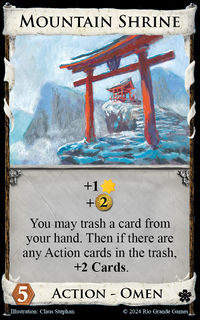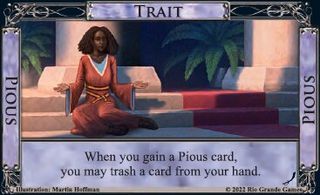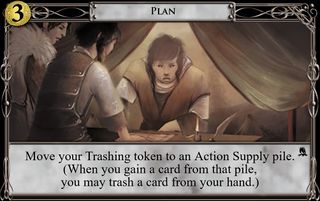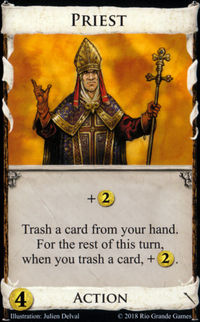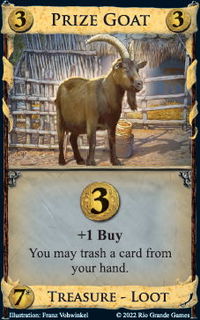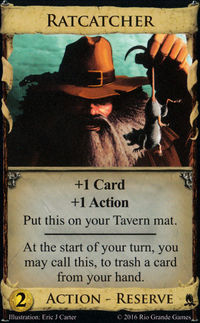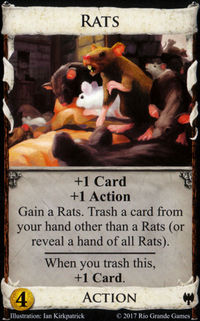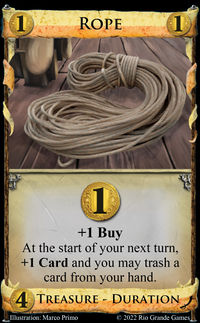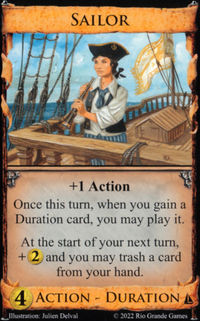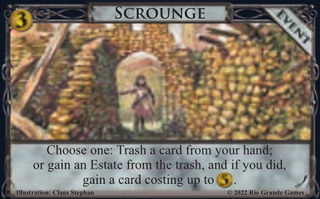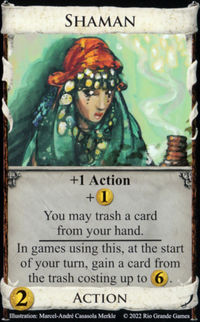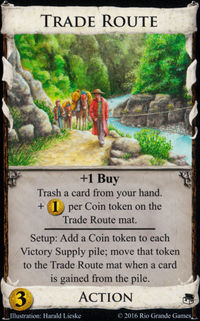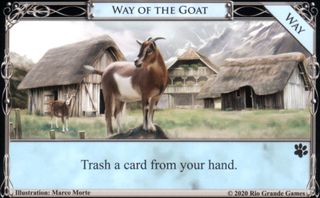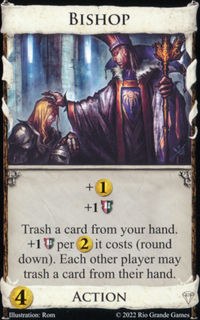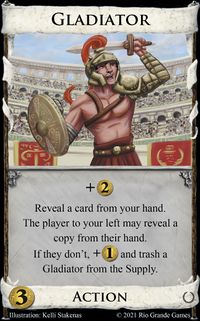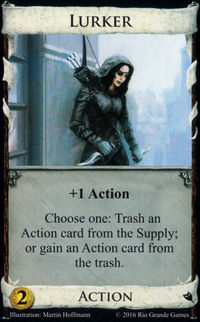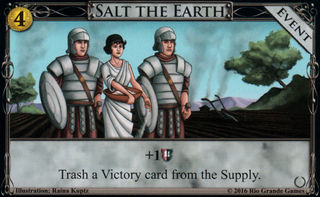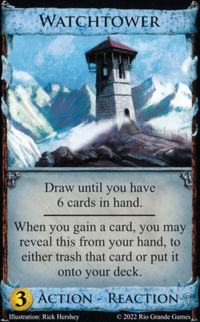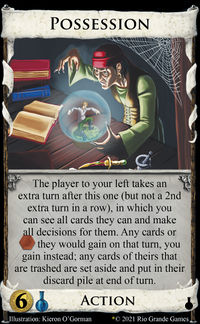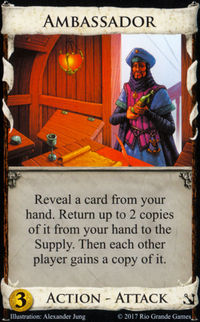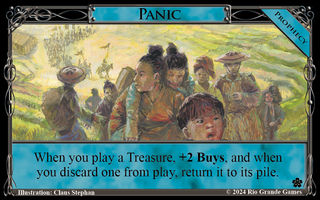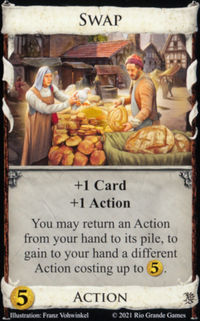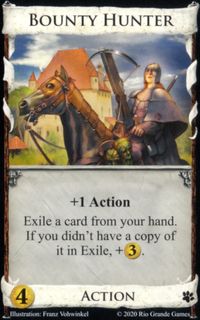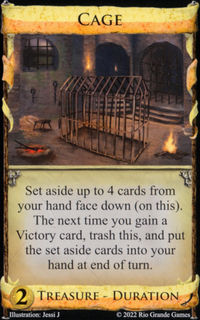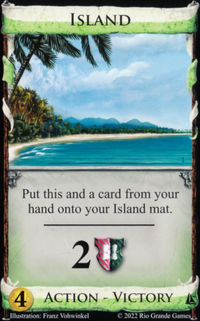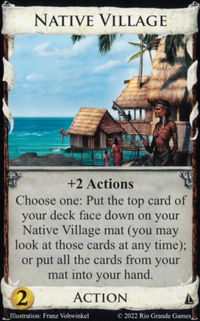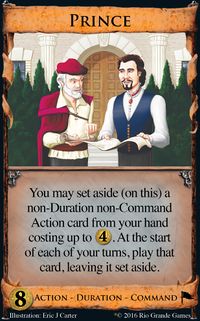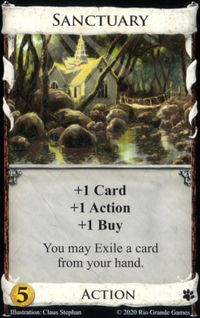Trasher: Difference between revisions
Werothegreat (talk | contribs) |
Wikiwikiwiki (talk | contribs) No edit summary |
||
| (91 intermediate revisions by 12 users not shown) | |||
| Line 1: | Line 1: | ||
[[Image:Chapel.jpg|thumb|right|200px|[[Chapel]], a trasher card.]] | [[Image:Chapel.jpg|thumb|right|200px|[[Chapel]], a trasher card.]] | ||
'''Trasher''' is the generic term for any card with the ability to [[trash]] one or more cards from your hand or deck. (Cards which trash another player's cards are considered [[trashing attack | '''Trasher''' is the generic term for any card with the ability to [[trash]] one or more cards from your hand or deck. (Cards which trash another player's cards are considered [[trashing attack]]s, while cards that trash themselves are referred to as [[one-shot]]s). | ||
There are two main uses for trashers. The first is simply to eliminate weak cards from the deck ("deck-thinning"), in order to enable faster [[cycling]] and have more concentrated hands of useful cards—this chiefly involves trashing starting cards ({{Card|Copper|Coppers}} and {{Card|Estate|Estates}} or | There are two main uses for trashers. The first is simply to eliminate weak cards from the deck ("deck-[[thinning]]"), in order to enable faster [[cycling]] and have more concentrated hands of useful cards—this chiefly involves trashing starting cards ({{Card|Copper|Coppers}} or [[Heirloom]]s and {{Card|Estate|Estates}} or {{Card|Shelter|Shelters|file=Shelters}}) and {{Card|Curse|Curses}}, but can also apply to cards that were purchased for early-game use and have outlived their usefulness, such as [[curser|cursers]] after the Curse pile is depleted. | ||
The second is to receive some benefit | The second is to receive some benefit as a result of trashing a card—either by trashing a card that has an on-trash effect, or because the trasher itself has a useful effect that requires you to trash a card in order to activate it. Trashers in this last category are often referred to under the umbrella term "[[trash for benefit]]", though sometimes (as below) the term specifically refers to trashers that give better benefits for trashing more valuable cards. | ||
=Types of trashers= | =Types of trashers= | ||
Cards in italics have been [[removed cards|removed]]. | |||
== | == Trashing attacks == | ||
[[Attack]] cards that trash other players' cards, can be found on the [[trashing attack]] page. | |||
== One-shots == | |||
Cards that trash themselves, or otherwise remove themselves from your custody, when you play them can be found on the [[one-shot]] page. | |||
== Trash for benefit == | == Trash for benefit == | ||
Cards that provide a benefit based on the trashed card, normally its cost, are called [[trash for benefit]]. If the benefit is gaining other cards based on the cost then it is a [[remodeler]]. | |||
See the [[trash for benefit]] and [[remodeler]] pages for more information and lists of cards. | |||
== | == Multi-card trashers == | ||
These cards allow rapid deck-thinning. {{Card|Chapel}} is the multi-card trasher ''par excellence'' due to the combination of its cheap price and the large number of cards it lets you trash; other multi-card trashers usually offer benefits in addition to trashing, or alternative effects that keep the card relevant after you've trashed all the cards you want to trash. | |||
* {{Card|Amulet}} — Two cards (one now and one at start of next turn) | |||
* {{Event|Asceticism}} — One card per {{Cost}} spent | |||
* {{Card|Bat}} — Two cards | |||
* {{Project|Cathedral}} — One card at start of every turn | |||
* {{Card|Cemetery}} — On-gain trashing effect, up to four cards | |||
* {{Card|Chapel}} — Up to four cards | |||
* {{Card|Count}} — Entire hand | |||
* {{Card|Dame Anna}} — Up to two cards | |||
* ''{{Card|Doctor}}'' — Up to three cards from the deck, also has a trashing effect as [[Overpay]] | |||
* {{Event|Donate}} — Any number of cards from hand and deck | |||
* {{Card|Forge}} — Any number of cards | |||
* {{Event|Maelstrom}} — Exactly three cards | |||
* {{Card|Mercenary}} — Exactly two cards | |||
* {{Card|Mint}} — On-gain trashing effect, trashing all non-[[Duration]] [[Treasure]]s in play | |||
* {{Card|Monastery}} — Dependent on how many cards you gained | |||
* {{Ally|Peaceful Cult}} — One card per [[Favor]] spent | |||
* {{Card|Remake}} — Exactly two cards | |||
* {{Card|River Shrine}} — Up to two cards | |||
* {{Card|Sauna}} — Dependent on how many {{Card|Silver|Silvers}} you play | |||
* {{Event|Sea Trade}} — Dependent on how many [[Action]] cards you have in play | |||
* {{Card|Secluded Shrine}} — Up to two cards | |||
* {{Card|Sentinel}} — Up to two cards from your deck | |||
* {{Card|Sentry}} — Up to two cards from your deck | |||
* {{Project|Sewers}} — One card when using another trasher | |||
* {{Card|Souk}} — On-gain trashing effect, up to two cards | |||
* {{Card|Steward}} — Exactly two cards | |||
* {{Card|Temple}} — Up to three differently named cards | |||
* {{Event|Trade}} — Up to two cards | |||
* {{Card|Trading Post}} — Exactly two cards | |||
{{Event|Banish}} can be used to [[Exile]], rather than trash, multiple cards from your hand. | |||
== Single-card trashers == | |||
These trashers have effects that are independent of the properties of the cards being trashed, and most can trash any card. These have a variety of uses: many are deck thinners or improvers; but for {{Card|Death Cart}}, for example, which can only trash [[Action]] cards, the trashing is in part a penalty to compensate for the strong {{Costplus|5}} effect. | |||
{{Card| | === Copper trashers === | ||
These cards are primarily used for trashing {{Card|Copper}}: some can ''only'' trash Copper, while the others can trash other [[Treasure]] cards as well, but do not provide better benefits for trashing more useful Treasures. | |||
* {{Event|Bonfire}} — can only trash Coppers | |||
* {{Card|Ducat}} — on-gain trashing effect, can only trash Copper. | |||
* ''{{Card|Loan}}'' | |||
* {{Card|Mint}} — on-gain effect, while not a single-card trasher, is also best used for trashing Copper. | |||
* {{Card|Moneylender}} — can only trash Copper | |||
* {{Card|Pooka}} | |||
* {{Card|Spice Merchant}} | |||
* {{Card|Treasurer}} | |||
Trashing Copper is also an important function of {{Card|Counterfeit}} and {{Card|Catapult}}, though they do give more powerful effects for trashing more valuable (or expensive) Treasures. | |||
{{Card|Monastery}} targets Copper specifically, but can also trash other cards. | |||
{{Card|Miser}} removes Coppers from your deck without trashing them. | |||
=== Estate trashers === | |||
These cards can't trash [[Treasure]] cards and don't give better benefits for trashing better cards. Therefore in the early game they're most likely to be used for trashing {{Card|Estate|Estates}} or {{Card|Shelter|Shelters|file=Shelters}} specifically; later in the game, they may be used on {{Card|Curse|Curses}}, obsolete early-game [[Action]]s, and cards with on-trash benefits. | |||
* {{Card|Acolyte}} | |||
* {{Card|Jack of All Trades}} | |||
* {{Card|Hermit}} | |||
* [[ | === Other limited trashers === | ||
These trashers typically give substantial bonuses, but can't trash most [[junk]] cards and therefore aren't usually an effective source of [[thinning]]. | |||
* [[ | * {{Event|Advance}} — [[Action]]s | ||
* {{Card|Death Cart}} — [[Action]]s | |||
* {{Card|Small Castle}} — [[Castle]]s | |||
* {{Ally|Woodworkers' Guild}} — [[Action]]s | |||
* {{Card|Zombie Apprentice}} — [[Action]]s | |||
== | === Can trash any card === | ||
These cards allow a card to be trashed but any other effects happen regardless of whether a card is actually trashed. | |||
* {{Card|Altar}} | |||
* {{Card|Crystal Ball}} — The top card from your deck | |||
* {{Card|Church}} | |||
* {{Boon|The Flame's Gift}} | |||
* {{Card|Forager}} | |||
* {{Card|Goat}} | |||
* {{Card|Goatherd}} | |||
* {{Card|Hideout}} — Gains a {{Card|Curse}} if the trashed card is a [[Victory]]. | |||
* {{Card|Infirmary}} | |||
* {{Card|Investment}} | |||
* {{Card|Junk Dealer}} | |||
* {{Card|Lookout}} — One of the three top cards from your deck | |||
* {{Card|Masquerade}} | |||
* {{Card|Mountain Shrine}} | |||
* {{Trait|Pious}} | |||
* {{Event|Plan}} | |||
* {{Card|Priest}} | |||
* {{Card|Prize Goat}} | |||
* {{Card|Ratcatcher}} | |||
* {{Card|Rats}} | |||
* {{Card|Rope}} | |||
* {{Card|Sailor}} | |||
* {{Event|Scrounge}} | |||
* {{Card|Shaman}} | |||
* ''{{Card|Trade Route}}'' | |||
* {{Way|Way of the Goat}} | |||
=== Other === | |||
* {{Card|Bishop}} — Allows other players to also trash a card, but without any benefit. | |||
* {{Card|Gladiator}} — Copies of itself from the [[Supply]] | |||
* {{Card|Lurker}} — [[Action]] cards from the [[Supply]] | |||
* {{Event|Salt the Earth}} — [[Victory]] cards from the [[Supply]]. | |||
* {{Card|Watchtower}} — Can be revealed to trash gained cards. Although not unusally considered a trasher, it is useful as a defens against [[junker]]s and as a way of activating cards' on-trash effects instantaneously. | |||
== Pseudo-trashers == | |||
These cards offer ways of removing cards from your deck other than trashing them. This can sometimes allow sneaky combos with {{Card|Possession}}. | |||
=== | === Returning to Supply === | ||
These return cards to the [[Supply]], removing them permanently from the player's ownership. | |||
These cards | * ''{{Card|Ambassador}}'' | ||
* {{Event|Panic}} | |||
* | * {{Card|Swap}} | ||
* | |||
* | |||
Several [[one-shot]] cards also return themselves to the supply, sometimes as part of [[exchange|exchanging]] themselves for another card. | |||
* | === Set aside or on a player mat === | ||
* | Although these remove cards from the player's deck, they are still owned by the player and count for scoring. | ||
* {{Event|Banish}} | |||
* {{Card|Bounty Hunter}} | |||
* {{Card|Cage}} — Sets aside cards that stays out of your deck until you start [[greening]]. | |||
* {{Card|Island}} | |||
* {{Card|Miser}} | |||
* {{Card|Native Village}} | |||
* {{Card|Prince}} — removing undesirable Action cards from the deck is not the best use of Prince. | |||
* {{Card|Sanctuary}} | |||
== | === Other === | ||
* {{Card|Masquerade}} — ''both'' allows you to pseudo-trash a card by passing it away ''and'' allows you to actually trash another card. | |||
* | |||
{{Navbox card categories}} | {{Navbox card categories}} | ||
[[Category:Other card categories]] | |||
[[Category: | |||
Latest revision as of 02:23, 11 September 2024

Trasher is the generic term for any card with the ability to trash one or more cards from your hand or deck. (Cards which trash another player's cards are considered trashing attacks, while cards that trash themselves are referred to as one-shots).
There are two main uses for trashers. The first is simply to eliminate weak cards from the deck ("deck-thinning"), in order to enable faster cycling and have more concentrated hands of useful cards—this chiefly involves trashing starting cards (Coppers or Heirlooms and Estates or Shelters) and Curses, but can also apply to cards that were purchased for early-game use and have outlived their usefulness, such as cursers after the Curse pile is depleted.
The second is to receive some benefit as a result of trashing a card—either by trashing a card that has an on-trash effect, or because the trasher itself has a useful effect that requires you to trash a card in order to activate it. Trashers in this last category are often referred to under the umbrella term "trash for benefit", though sometimes (as below) the term specifically refers to trashers that give better benefits for trashing more valuable cards.
Types of trashers
Cards in italics have been removed.
Trashing attacks
Attack cards that trash other players' cards, can be found on the trashing attack page.
One-shots
Cards that trash themselves, or otherwise remove themselves from your custody, when you play them can be found on the one-shot page.
Trash for benefit
Cards that provide a benefit based on the trashed card, normally its cost, are called trash for benefit. If the benefit is gaining other cards based on the cost then it is a remodeler.
See the trash for benefit and remodeler pages for more information and lists of cards.
Multi-card trashers
These cards allow rapid deck-thinning. Chapel is the multi-card trasher par excellence due to the combination of its cheap price and the large number of cards it lets you trash; other multi-card trashers usually offer benefits in addition to trashing, or alternative effects that keep the card relevant after you've trashed all the cards you want to trash.
- Amulet — Two cards (one now and one at start of next turn)
- Asceticism — One card per spent
- Bat — Two cards
- Cathedral — One card at start of every turn
- Cemetery — On-gain trashing effect, up to four cards
- Chapel — Up to four cards
- Count — Entire hand
- Dame Anna — Up to two cards
- Doctor — Up to three cards from the deck, also has a trashing effect as Overpay
- Donate — Any number of cards from hand and deck
- Forge — Any number of cards
- Maelstrom — Exactly three cards
- Mercenary — Exactly two cards
- Mint — On-gain trashing effect, trashing all non-Duration Treasures in play
- Monastery — Dependent on how many cards you gained
- Peaceful Cult — One card per Favor spent
- Remake — Exactly two cards
- River Shrine — Up to two cards
- Sauna — Dependent on how many Silvers you play
- Sea Trade — Dependent on how many Action cards you have in play
- Secluded Shrine — Up to two cards
- Sentinel — Up to two cards from your deck
- Sentry — Up to two cards from your deck
- Sewers — One card when using another trasher
- Souk — On-gain trashing effect, up to two cards
- Steward — Exactly two cards
- Temple — Up to three differently named cards
- Trade — Up to two cards
- Trading Post — Exactly two cards
Banish can be used to Exile, rather than trash, multiple cards from your hand.
Single-card trashers
These trashers have effects that are independent of the properties of the cards being trashed, and most can trash any card. These have a variety of uses: many are deck thinners or improvers; but for Death Cart, for example, which can only trash Action cards, the trashing is in part a penalty to compensate for the strong + effect.
Copper trashers
These cards are primarily used for trashing Copper: some can only trash Copper, while the others can trash other Treasure cards as well, but do not provide better benefits for trashing more useful Treasures.
- Bonfire — can only trash Coppers
- Ducat — on-gain trashing effect, can only trash Copper.
- Loan
- Mint — on-gain effect, while not a single-card trasher, is also best used for trashing Copper.
- Moneylender — can only trash Copper
- Pooka
- Spice Merchant
- Treasurer
Trashing Copper is also an important function of Counterfeit and Catapult, though they do give more powerful effects for trashing more valuable (or expensive) Treasures. Monastery targets Copper specifically, but can also trash other cards. Miser removes Coppers from your deck without trashing them.
Estate trashers
These cards can't trash Treasure cards and don't give better benefits for trashing better cards. Therefore in the early game they're most likely to be used for trashing Estates or Shelters specifically; later in the game, they may be used on Curses, obsolete early-game Actions, and cards with on-trash benefits.
Other limited trashers
These trashers typically give substantial bonuses, but can't trash most junk cards and therefore aren't usually an effective source of thinning.
- Advance — Actions
- Death Cart — Actions
- Small Castle — Castles
- Woodworkers' Guild — Actions
- Zombie Apprentice — Actions
Can trash any card
These cards allow a card to be trashed but any other effects happen regardless of whether a card is actually trashed.
- Altar
- Crystal Ball — The top card from your deck
- Church
- The Flame's Gift
- Forager
- Goat
- Goatherd
- Hideout — Gains a Curse if the trashed card is a Victory.
- Infirmary
- Investment
- Junk Dealer
- Lookout — One of the three top cards from your deck
- Masquerade
- Mountain Shrine
- Pious
- Plan
- Priest
- Prize Goat
- Ratcatcher
- Rats
- Rope
- Sailor
- Scrounge
- Shaman
- Trade Route
- Way of the Goat
Other
- Bishop — Allows other players to also trash a card, but without any benefit.
- Gladiator — Copies of itself from the Supply
- Lurker — Action cards from the Supply
- Salt the Earth — Victory cards from the Supply.
- Watchtower — Can be revealed to trash gained cards. Although not unusally considered a trasher, it is useful as a defens against junkers and as a way of activating cards' on-trash effects instantaneously.
Pseudo-trashers
These cards offer ways of removing cards from your deck other than trashing them. This can sometimes allow sneaky combos with Possession.
Returning to Supply
These return cards to the Supply, removing them permanently from the player's ownership.
Several one-shot cards also return themselves to the supply, sometimes as part of exchanging themselves for another card.
Set aside or on a player mat
Although these remove cards from the player's deck, they are still owned by the player and count for scoring.
- Banish
- Bounty Hunter
- Cage — Sets aside cards that stays out of your deck until you start greening.
- Island
- Miser
- Native Village
- Prince — removing undesirable Action cards from the deck is not the best use of Prince.
- Sanctuary
Other
- Masquerade — both allows you to pseudo-trash a card by passing it away and allows you to actually trash another card.


